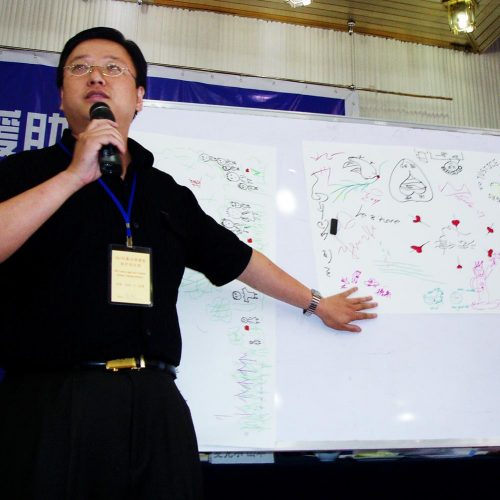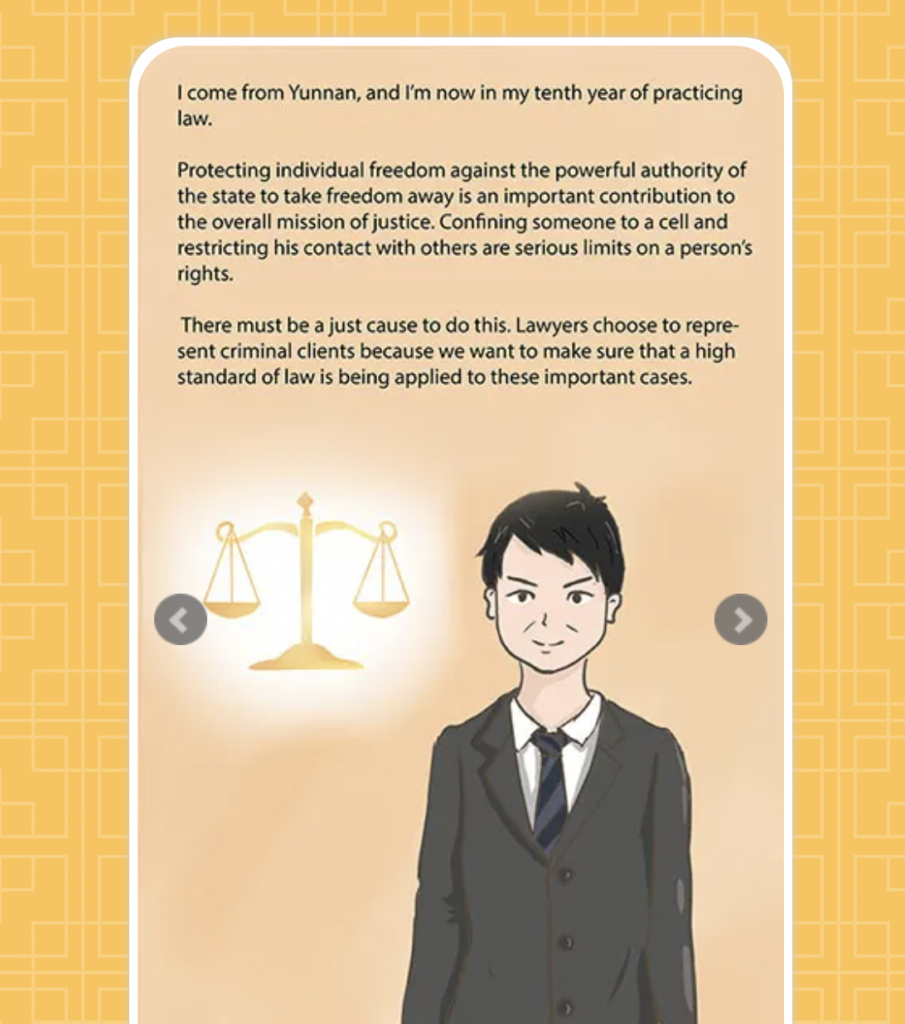IBJ’s work in China began in 2001 with a signed Memorandum of Understanding with the National Legal Aid Centre of China’s Ministry of Justice. Since then, work has continued alongside government institutions and members of the criminal justice community in China to generate sustainable reforms.
Impact Narratives:
Duty Lawyers
Many countries with developed legal systems use a duty lawyer scheme to ensure individuals without the means to afford a lawyer can have immediate access to legal representation. Whether it is through a panel of private lawyers or dedicated public defenders, suspects and accused individuals are provided with a duty lawyer from the moment they are brought in to a police station for interrogation.
Click here to read the rest of the narrative
Though highly effective for decreasing rights violations, unnecessarily lengthy pre-trial custody, and wrongful convictions, no such system existed in China when International Bridges to Justice (IBJ) began work in 2001. At the time, police and prosecutors rarely faced defense lawyers at such an early stage, and as a result, accused individuals often remained in pretrial custody and rates of case dismissals were low.
In recognition of this dearth of representation at the pretrial stage, IBJ implemented a Pre-Trial Investigation and Discovery Project in Shijiazhuang in 2006. In cooperation with the local bureau of justice, IBJ trained and mentored defense attorneys as they were given access to cases in the pretrial stage. As a result, there was a 300% increase in the number of cases assigned in the pre-trial stage. Within the first years of IBJ’s involvement, lawyers became better equipped to help their clients obtain reduced sentences with compelling arguments and investigative tools.
Building on this success, IBJ began planning for a Duty Lawyer Pilot Project in 2007 to station lawyers at detention centers or assign lawyers at the investigation stage. After exploring possible locations and project partners, IBJ launched the project in 2010 in Xi’an with cooperation from the district prosecutor, three local law firms, and a detention center. In its first year, the project represented 53 cases and 15 duty lawyers were trained. According to the office of the local prosecutor, the period of pre-trial custody fell sharply as a result of duty lawyers’ advocacy, and more cases resulted in dismissals or mitigated sentences. In total, 153 indigent defendants were represented during the course of the pilot, and the defense representation rate for the district rose astoundingly from 15% in 2010 to 65% in 2011.
This early pilot provided effective proof for the implementation of a nationwide duty lawyer scheme that was introduced into law in China in 2018. According to Article 36 of the revised Criminal Procedure Law, legal aid institutions can station duty lawyers in courts and detention centers, and duty lawyers can represent suspects at the earliest stages of the investigation when a private lawyer or legal aid lawyer have not yet been retained. Having worked on this issue for over a decade, IBJ was well positioned to support these new duty lawyers. IBJ staff immediately created an eLearning training module on The Role and Responsibilities of a Duty Lawyer, helping duty lawyers to leverage their positions to effectively advocate for their clients and protect the rights of defendants. Throughout the years, IBJ has carried through the initiative for a duty lawyer system from infancy as a single-city pilot, to nationwide institutionalization, and now to broad public awareness.
Creation of the Appropriate Adult Scheme
When International Bridges to Justice (IBJ) first began work in China in 2001, nearly all juvenile cases were unrepresented. A child accused of a crime rarely had legal counsel or knowledge of their rights. Often, these children did not even have a trusted adult to ensure their care or see that their case was handled appropriately.
Click here to read the rest of the narrative
Alone and with their welfare in jeopardy, children waited months to be seen in court where they were almost always handed guilty verdicts due to China’s extremely high conviction rate. This violated the articles of the United Nations Convention on the Rights of the Child, ratified in 1992, which guarantee that children be treated appropriately for their age while in custody.
To address these issues, IBJ launched a Juvenile Justice Project in 2006, spearheading an investigation into issues regarding juvenile justice in China and sparking a collaborative movement for change. Partnering with local legal aid centers and bar associations in Anhui Province, Henan Province, Chongqing Municipality, Tianjin Municipality, and Ningxia Autonomous Region, IBJ initiated lawyer trainings focused on issues unique to young people caught in the juvenile justice system.
In January 2007, IBJ helped broker a landmark agreement between the Tianjin prosecutor’s office and the Tianjin legal aid center to have the prosecutor’s office assign legal aid to all juvenile suspects. In addition, a lawyer or guardian would be required to be present at all juvenile interrogations. As a result, Tianjin saw a rapid rise in the number of cases assigned in the pre-trial stage. This marked a first of its kind cooperation between a legal aid office and a prosecutor’s office in China. Within a short time, a case involving twelve students avoided prosecution due to swift intervention by lawyers to return the students back to school. Outreach in the following years and news of IBJ’s successes attracted attention from other jurisdictions who requested to be made part of IBJ’s future programs.
A movement for an Appropriate Adults (AA) system began across China in 2010 in order to provide accused juveniles with a trusted adult to support their case. Depending on the specific project and location, the AA was either a lawyer, a social worker, or some other individual with a background in juvenile development. IBJ was on the front lines of this work. In September 2010, IBJ hosted a Juvenile Justice Roundtable at its Northwest Defender Resource Center (NWDRC) in Xi’an, Shaanxi Province, where legal professionals were introduced to and trained on two AA systems – one implemented by Save the Children in Kunming where juveniles were provided with an AA similar in function to a probation counselor, and one implemented by the procuratorate in Chongqing where youth were provided with a legal aid lawyer as soon as they were detained.
That same year, IBJ implemented an AA pilot project within the juvenile pretrial investigation services department of the Xincheng District Procuratorate in Xi’an. AAs in this pilot project were comprised of social workers, retired judges, retired prosecutors, law professors, and graduate students in social work. An AA was appointed in each juvenile case to conduct a social background investigation report for submission to the court, draft a rehabilitation plan, and help the juvenile reintegrate into society by enrolling in school or finding a suitable job. In each of the pilot cases, defense lawyers had access to their client at the prosecution stage and could make use of these background reports and rehabilitation plans. IBJ provided training to AAs and created a manual for conducting social background reports.
This movement eventually led to the introduction of an AA system at the national level through the 2012 revision of the Criminal Procedure Law (CPL). Art. 270 (later revised to Art. 281 in the 2018 CPL) allows for adult family members or adults from the juvenile’s school, workplace, residential community, or child protective social agencies to step in when his or her legal representative cannot be present. These adult advocates are permitted as early as the first interrogation of the child. This revision of the CPL also stipulated (Art. 278) that a legal aid lawyer should be notified and assigned whenever a juvenile suspect is unrepresented.
Once these ideas were enshrined in law, implementation in a variety of manners began to take place across the country. In 2013, the Shenzhen justice bureau and prosecutor’s offices sought IBJ’s help in setting up an AA system, so IBJ organized ten volunteers with social work or legal backgrounds to act as AAs for juveniles. Within the first month, six juvenile suspects received protection while in custody from IBJ’s trained volunteers and were given social background investigations. Simultaneously, IBJ held a training on AAs for local prosecutors and lawyers, and distributed copies of our Social Background Investigation Training Manual.
In 2017, the Guidelines for Juvenile Criminal Prosecution (Trial Implementation) were issued by the Supreme People’s Procuratorate, and further clarified the rights and responsibilities of the AA. In addition, the Guidelines strengthened the AA system by clarifying that evidence or testimony obtained from a juvenile during the investigation stage without the presence of an AA could be excluded at trial. There of course remains much more work to be done in bolstering the implementation of the AA system, as the lack of available and qualified AA candidates, especially in rural areas, leads often times to token representation. Nevertheless, the progress achieved over the past two decades is significant, and IBJ is proud to have led the charge, through a blend of pilot projects, trainings, and partnerships, to create and expand the Appropriate Adult scheme throughout China to protect juveniles at risk.
Criminal Record Sealing for Juveniles
Since International Bridges to Justice (IBJ) began its programming in China, it has been dedicated to facilitating reforms to better serve juveniles in partnership with the Chinese government on a local and national level. What’s more, IBJ has paid attention to how juveniles in conflict with the law can be rehabilitated.
Click here to read the rest of the narrative
Oftentimes, bias against juveniles with a criminal record hinders their ability to re-enter society after completing their sentences. Social ostracization pushes these vulnerable youth into even more extreme circumstances. With these issues in mind, IBJ was uniquely poised to lead the campaign for record sealing for juvenile cases. Record sealing means that a juvenile’s criminal records remain confidential when they reach adulthood to give them a better opportunity to rehabilitate without social rejection.
In the Spring of 2009, IBJ partnered with a leading law professor and expert on juvenile justice from Peking University to conduct multiple juvenile justice pilot projects in Shandong Province. Among these was a project at the Licang District Court on the sealing of juvenile criminal records. Under this project, guidelines were drafted governing the conditions when record sealing would be applicable, and using these guidelines, 30 cases were selected from among the juvenile cases handled by the court for record sealing. Another 30 cases from the pool of juvenile cases handled by the court were selected as comparative cases.
In October 2009, IBJ and the China Juvenile Delinquency Research Center organized the Qingdao Juvenile Criminal Records Sealing Training for ninety legal professionals where IBJ and its partners shared about the juvenile record sealing pilot in Shandong province. Fifteen judges and fifteen prosecutors took part, offering significant investment from Chinese officials in progressing reforms. The impact of the pilot project continued to expand as later that same year, the Qingdao City Intermediate People’s Court announced that it would also promote juvenile criminal record sealing using our pilot project in Licang District Court as a model and asking our partnering law professor to act as a consultant, and then the Shandong High Court announced the same in the fall of 2010.
Further advocacy continued with an even higher profile in the years after as IBJ hosted multiple trainings across the country on the topic:
- In April 2010, IBJ held a two-day training in Dezhou, Shandong Province, for 120 legal professionals on juvenile record sealing and social background investigation reports.
- In December 2010, IBJ was able to share its energizing findings on record sealing at a national Juvenile Justice Conference in Nanchang where a productive conversation emerged over record sealing projects.
- At the Juvenile Justice Reform Conference held in January 2011, IBJ partnered with Peking University and the Shandong High Court to hold a panel discussion on record sealing. Seven judges from the Shandong High Court led a public discussion on the challenges and successes presented by juvenile record sealing. The conversation, with an audience of 110 law professional attendees, included privacy and social issues inherent to record sealing.
As a result of this IBJ-led outreach, record sealing began being implemented across many courts in China seeking to facilitate rehabilitation.
This effort culminated in a major revision to the Criminal Procedure Law in 2013 which stated that juveniles convicted and sentenced to less than five years imprisonment shall have their criminal records sealed (now Article 286 in the 2018 version of the CPL). Previously, convicted individuals would have their criminal records reported when applying for a job or joining the military. In a sweeping success, the new law took the black mark of a criminal record off personal files and provided a clean slate for juveniles looking to rebuild their lives. This law was further clarified in 2022 with the enactment of the Implementation Measures for the Sealing of Juveniles’ Criminal Records, ensuring juvenile records are properly labeled and stored, and that they are promptly sealed within three days of the conclusion of the case.
IBJ’s grassroots work, in close relationship with local officials and leading academics, allowed for an informed and effective promotion of record sealing, leading to major developments today.
Impact in Numbers:
China has only 400,000 lawyers for a population of more than 1.4 billion. The practice of criminal defense law is also regarded as a high-risk profession, resulting in a very large number of criminal defendants unrepresented at trial. Despite this shortfall, IBJ has been working alongside the criminal justice community to achieve impactful representation and change.
- 186k+ people provided with legal representation
- 30k+ lawyers trained
- 9k+ justice officials trained through roundtables
- 11,6m+ people reached through rights awareness campaigns
- 19 podcasts recorded
- 232 eLearning Modules created
- Over 23,000 people reached through a digital rights awareness game on the rights of juveniles.
Data as of June 2022

High impact successes :
- Interrogation-Stage Pilot Project: In Fujian, 58.6% of cases resulted in judgements adopting the defense lawyer’s recommendation, and 12% of cases resulted in verdicts of “not guilty.”
- Standards on Representing Defendants with Disabilities: Standards adopted and piloted in at least 3 provinces, and the language from the standards was included in a regulation promulgated by the Supreme People’s Procuratorate and the China Disabled Persons Federation.
- Duty Lawyer Program: Our program in Shaanxi Province providing early access to competent legal counsel laid the groundwork for the 2018 creation of a nation-wide Duty Lawyer scheme now codified in China’s Criminal Procedure Law.
- Juvenile Justice Project: Spearheaded early access to counsel and the use of social background investigations for juveniles, both of which were later incorporated into the 2013 Criminal Procedural Law and various implementing regulations.
- Pre-Trial Discovery and Investigation Pilot: Led to a 300% increase in the number of cases assigned a lawyer during the pre-trial stage.
- Model Legal Aid Centers in Anhui Province saw a 27% increase in caseload productivity
- 2,000 Chinese police officers have been trained in modern investigative techniques to reduce the use of torture to coerce confessions
Defender resources:
We provide training, tools, manuals and eLearning, developed with our partners, funded through grants, and resourced through pro-bono assistance. We have seen our eLearning materials accessed over 100,000 times.
- DefenseWiki – references, legal codes, and assessments
- Defender Manual – Juvenile Justice ToolKit – Mandarin
- Defender Manual – China Defender Toolkit – Mandarin
- eLearning Modules – in-depth and topic-focussed training

Rights Awareness Platforms :
The IBJ China Country Program has developed various online resources providing a wealth of materials aimed at improving access to justice and legal support across China. Visitors can explore our comprehensive resources, including educational tools for understanding children and youth’s rights, insights into criminal defense practices and stories, and support for marginalized communities. Our content is designed for legal professionals, educators, and advocates, fostering deeper engagement with critical issues such as mental health in legal contexts, evidence handling, and constitutional protections for minority groups.
Click on the images below to access the resources

IBJ’s Approach:
Strategic partnerships have been created with the National Legal Aid Center (now the Public Legal Services Department), All China Lawyers’ Association, People’s Public Security University (the country’s key police training institute), major universities (Peking University, Renmin University, Tsinghua University, and China University of Political Science and Law), 23 regional universities, and numerous law firms, regional bar associations, justice bureaus, procuratorates, many key civil society organizations, and with over 9,000 justice officials.

What we need:
There are many ways to get involved, to help make a long term difference. Please get in touch.
Contact us at internationalbridges@ibj.org


